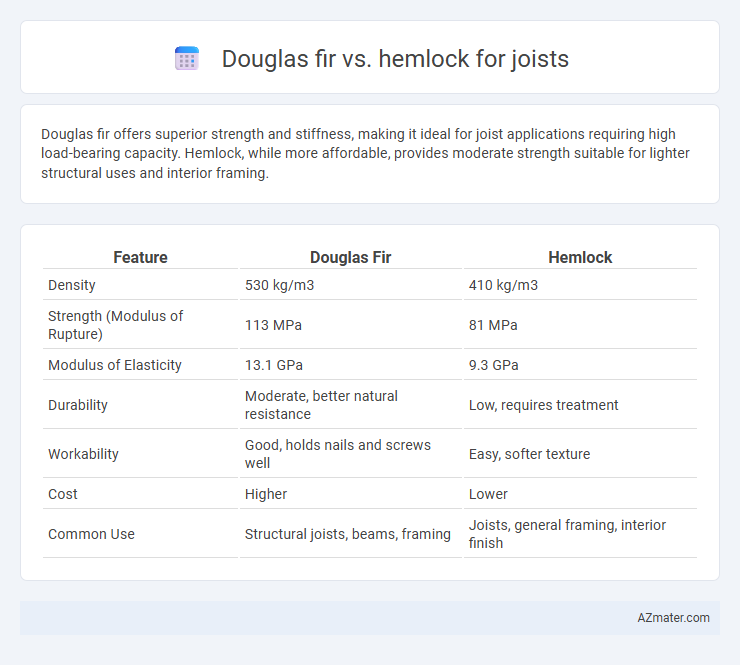Douglas fir offers superior strength and stiffness, making it ideal for joist applications requiring high load-bearing capacity. Hemlock, while more affordable, provides moderate strength suitable for lighter structural uses and interior framing.
Table of Comparison
| Feature | Douglas Fir | Hemlock |
|---|---|---|
| Density | 530 kg/m3 | 410 kg/m3 |
| Strength (Modulus of Rupture) | 113 MPa | 81 MPa |
| Modulus of Elasticity | 13.1 GPa | 9.3 GPa |
| Durability | Moderate, better natural resistance | Low, requires treatment |
| Workability | Good, holds nails and screws well | Easy, softer texture |
| Cost | Higher | Lower |
| Common Use | Structural joists, beams, framing | Joists, general framing, interior finish |
Introduction to Douglas Fir and Hemlock Joists
Douglas Fir joists are prized for their exceptional strength-to-weight ratio and dimensional stability, making them ideal for structural applications requiring reliable load-bearing capacity. Hemlock joists offer a lighter alternative with a fine, straight grain that allows for easier machining and consistent performance in interior framing projects. Both species provide durability, but Douglas Fir's higher density results in greater stiffness, which is crucial for long-span joist installations.
Wood Species Overview: Douglas Fir vs Hemlock
Douglas Fir joists offer superior strength, stiffness, and durability compared to Hemlock, making them ideal for heavy structural applications. Hemlock, while lighter and easier to work with, has lower load-bearing capacity and slightly less resistance to decay and insect damage. Both species are commonly used in construction, but Douglas Fir's higher density and superior mechanical properties make it the preferred choice for joists requiring enhanced load support.
Strength and Structural Performance
Douglas fir joists exhibit superior strength and structural performance compared to hemlock, with a higher modulus of elasticity (1.8 million psi vs. 1.2 million psi) and greater bending strength, making them ideal for load-bearing applications. Hemlock, while more affordable and easier to work with, has lower density and stiffness, resulting in less resistance to deflection and lower overall strength. For critical structural components such as floor joists and roof rafters, Douglas fir provides enhanced durability and load capacity, ensuring long-term stability.
Durability and Resistance to Decay
Douglas fir joists are highly valued for their superior durability and natural resistance to decay, making them ideal for structural applications in both interior and exterior environments. Hemlock, while also strong, tends to have lower resistance to fungal decay and moisture-related damage compared to Douglas fir, which can affect long-term performance. For joists requiring enhanced longevity and decay resistance, Douglas fir is generally the preferred choice due to its dense grain and natural preservative oils.
Workability and Ease of Installation
Douglas fir joists offer superior workability due to their straight grain and uniform texture, making them easier to cut, nail, and shape compared to hemlock. Hemlock is more prone to splintering and may require pre-drilling for fasteners, which can slow down installation. The lighter weight of Douglas fir also facilitates easier handling and quicker assembly on site, enhancing overall installation efficiency.
Cost Comparison: Douglas Fir vs Hemlock
Douglas fir joists typically cost more than hemlock due to their superior strength and durability, which can provide better long-term value in structural applications. Hemlock joists are generally more affordable upfront but may require additional treatment or maintenance to match Douglas fir's performance in load-bearing scenarios. Choosing between the two depends on budget constraints and the specific structural requirements of the project.
Availability and Sourcing Considerations
Douglas fir joists are highly favored due to their widespread availability and consistent supply from well-managed North American forests, ensuring reliable sourcing for construction projects. Hemlock joists, though also sourced primarily from the Pacific Northwest, tend to have more variable availability and may require sourcing from smaller mills, impacting lead times and cost. Understanding regional supply chains and seasonal harvesting cycles is crucial for selecting between Douglas fir and Hemlock joists to minimize project delays and ensure material quality.
Environmental Impact and Sustainability
Douglas fir joists offer superior sustainability due to their fast growth rate and widespread availability, ensuring lower ecological footprints compared to other softwoods. Hemlock, while less durable, is often sourced from responsibly managed forests, contributing to sustainable forestry practices. Both timber options support carbon sequestration, but Douglas fir's efficiency in growth and strength typically results in a more environmentally friendly choice for structural joists.
Common Applications in Construction
Douglas fir joists are widely favored in construction for their exceptional strength-to-weight ratio, making them ideal for heavy-load bearing applications such as floor framing, roof trusses, and beams in residential and commercial buildings. Hemlock joists, while less dense and slightly lower in strength, are commonly used in light to medium structural applications including interior framing, ceiling joists, and non-load bearing walls due to their ease of handling and good dimensional stability. Both species are valued for their resistance to warping and splitting, but Douglas fir's superior durability and stiffness often make it the preferred choice for high-stress structural components in construction projects.
Which Wood is Best for Joists?
Douglas fir is often preferred for joists due to its exceptional strength-to-weight ratio and high load-bearing capacity, making it ideal for structural support. Hemlock, while sufficiently strong and more cost-effective, generally offers lower stiffness and durability compared to Douglas fir, which may affect long-term performance under heavy loads. For optimal joist applications where strength, stability, and resistance to bending are critical, Douglas fir is the superior choice.

Infographic: Douglas fir vs Hemlock for Joist
 azmater.com
azmater.com